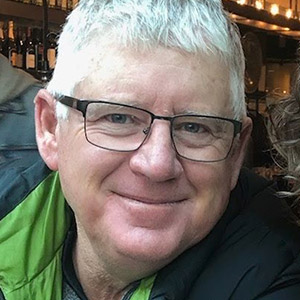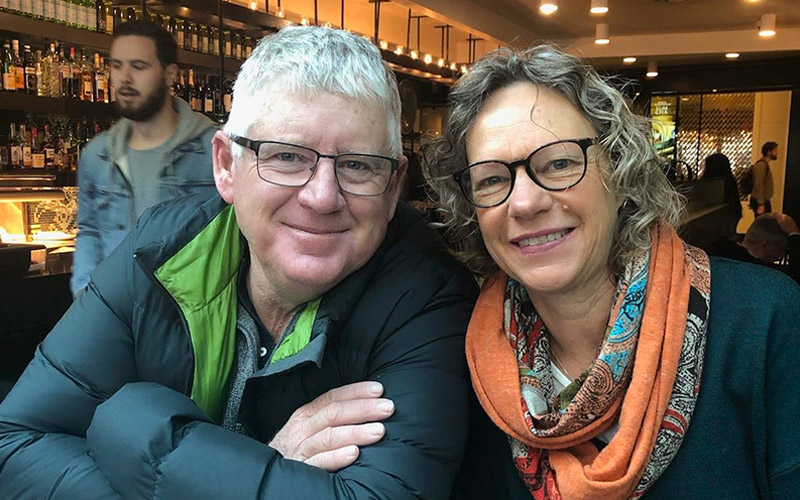Rick and his wife Lynette recently spent two weeks volunteering on Kangaroo Island, rolling up damaged fences and listening to local residents. In this blog, he shares his thoughts on the Kangaroo Island crisis, the community and the importance of just listening.
 The damage and personal losses are unimaginable
The damage and personal losses are unimaginable
SAMHC Featured Blogger:
Rick Hinge
Beyond Blue Ambassador
Former Dairy SA Wellbeing Coordinator
The fire was extinguished when we arrived on Kangaroo Island but we were really shocked by the enormity of the damage: half of the Island almost completely burnt, and a significant area of the other half burnt as well.
It must have felt like the whole island was under threat. We had heard about the size of the fire but when we saw the damage, we were without words. The personal loss was astounding with many houses, sheds woolsheds and fences destroyed. I thought of all the clothes toys, photos, computers, memories favourite spots in the bush creeks, pets… the loss is unimaginable. The native bush was almost completely gone as well, and native animals were in the line of fire.
My wife Lynette and I were on Kangaroo Island to see if we could offer practical and emotional support. We were privileged to stay with a local family who helped us link to surrounding farmers where we helped with various tasks. We noticed an attitude of caring and practical help that you rarely see other than in crisis. Observing these simple acts of caring will remain with us forever. People were dealing with their great losses differently. Mostly what we saw was a desire to get some basics fixed. The dead livestock had all been disposed of before we arrived. People who had lost homes had found accommodation and the generosity of people was amazing. Fencing was of high priority as most of the boundary fences had been damaged, and feed for the surviving stock was urgently needed.

Many people are in planning mode; they’re about fixing stuff but taking time off was difficult. They just wanted to get the next task done: fencing for surviving sheep and cattle and working out where their next dollar was coming from. What do they have to buy so they can start to earning a living again? They had to check on insurance.
We were surprised with the power and phone outages, but the locals seemed to meet the frustration with a minimum of fuss. It was heartbreaking to see property after property destroyed. We witnessed farmers and their partners working away cleaning up the mess or instructing helpers where to go and what to do.
Fatigue must have been intense although the human body has an amazing ability to endure. The Island had experienced several fires through the period from early December, not just the one. Many people had been involved with fighting fires for extended periods. I’m aware that fatigue and grief and loss can disrupt sleeping patterns. We can become less tolerant, make poorer decisions, change our mood, and noise can irritate. My advice is not to get stuck in this state – find the best people you can help you through it.
Along with the generosity of the community and individuals, organisations such as Livestock SA, the Army and Blaze aid RSPCA are taking action in a practical and supportive way.
Listening is so important when we communicate. What people need and what we think others need are often two different things, so our great intentions become just another thing to sort out.
Farmers generally spend most of their time working by themselves or at least with just a few others around. It is wise to remember this whenever you want to meet with men to convey information or hold a public gathering.
Rural men in particular feel uncomfortable revealing their vulnerability in public. They’re more comfortable in their own kitchen or shed or leaning over a gate gazing out into a paddock while talking, and hardly making eye contact. Given the right circumstance I find most men are happy to chat and the best conversations can often be one on one.
For the first week, we pretty much rolled up fences. When fences are burnt, all that’s left is cyclone wire lying on the ground. It has to be rolled up and the area levelled off ready for the new fence. The best part in this job is you can see where you have been, gives a sense of achievement.
We felt happy to do this and it’s surprisingly not as big a chore as you’d expect because you feel like you’re doing something useful in helping people endure a pretty difficult time. You gain a desire to be the most useful you can be.
For me, it’s about building rapport and trust through listening, a safe place for people to talk, a gentle place to exist and showing you can be in the presence of a person when things are uncomfortable. A fair bit is left unsaid and a lot can be conveyed in the silence: no matter what state you’re in, you’re going to be all right.
Sometimes, they may ask me to go and see a mate who’s not doing so well. There is a genuine concern for others amongst country folk. I listen and look for a question that might ease the situation
Unless you’ve been involved in trauma, life pretty much goes on as if nothing happened. It’s your cross to bear, you believe that no one feels it like you do. It’s quite an interesting thing. I can remember going through difficult times and seeing people going about their lives in the street and wondering why aren’t they affected by what has gone on, how can they sleep well with no worries?
Dealing with issues like loss, hardship and feeling like you can’t control things are difficult to negotiate but we all have our own ways to survive it.
But when we get stuck it’s valuable to find someone we trust to chat to sometimes a mate is enough but sometimes we need extra skills to help us deal with stuff.
By Rick Hinge
Beyond Blue Ambassador
Former Dairy SA Wellbeing Coordinator
What helps when you’re suffering?
- If you have a close friend talk often. i.e. phone or visit
- What can I do to make things easier in the moment?
- Walk/exercise
- Do a task with someone you trust.
- Ask for help with the things you are most worried about.
- Massage, Hugs, Acceptance
- Get sleep, it’s sometimes difficult to fall asleep or return to sleep.
- Talk to your GP
- Sit and enjoy your favourite drink
- Use multi levels of support and care through friends/family, GP, Counsellor, Health Worker, Psychologist, Psychiatrist, Mindfulness
- Talking with someone you trust, who accepts you as you are, can make a difference.
- Be gentle with yourself.
- Resist making major decisions while unwell.
- Eat a balanced diet
How the carer can help:
- Accept the person without preconceived ideas.
- Resist giving answers, listen
- Know the alternate help that is available
- Deal with the need of the moment, physical/emotional need
- Be sensitive to the length of visit, not too long or short
- Maintain confidentiality
- Your being there often speaks louder than anything you might say.
- Refer them to someone you have trust in, take them if need be.
Rick Hinge is the son of a fifth-generation Mundulla farmer and former Dairy SA Wellbeing Coordinator. He has spent the best part of 10 years listening to rural people and seeing if he can make a difference. He worked with the Tactics for Tight Times program which is supported by the SA Dairy Farmers Association and PIRSA.
Rick creates spaces where people feel comfortable enough to communicate what’s going on and links them to much-needed resources. Opening up can be particularly tricky for rural men. He has worked with the Drought Assistance program, Mind Australia and is an Ambassador for Beyond Blue.
SAMHC Featured Bloggers
The SAMHC presents our series of guest featured bloggers who generously share their personal thoughts and experiences of mental health and wellbeing.


